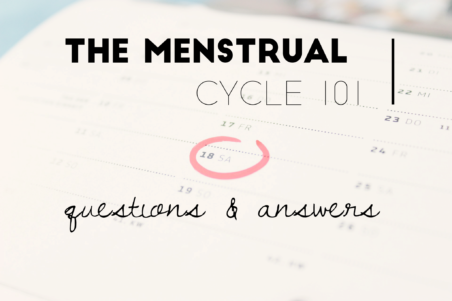The menstrual cycle is a mystery to so many women who come into my office. That is the reason why I have put together this series, to provide you with an indepth look at your lady biz! I realize that to some of you the last few weeks have been a lot of the dirty nerd content so this week were going to shake it up! Today I am going to lay out some of the most common questions that I get about the menstrual cycle in rapid fire style.
Have other questions? I would love to answer them. Comment below or come find me on Facebook or Instagram!
Question: “Why do we get period cramps?”
Answer: We do not know the full answer to this question but one thing we do know is that prostaglandins are involved. Prostaglandins are inflammatory compounds that are involved in the shedding of our uterine lining. Some people have elevated levels of these, and inflammation, which causes significant pain. For other people, low progesterone levels mean it takes more blood flow and effort for your body to shed the lining and this can also lead to increased pain levels, possibly related to inflammation as well. (FYI: if you have significant pain get checked out for endometriosis, adenomysosis and uterine fibroids!)
Question: “How does the oral contraceptive pill (OCP) work to balance your hormones?”
Answer: IT DOES NOT. I wouldn’t go so far is to say that this is a pet peeve, but I really wish I knew that when I went on the birth control pill it in no way “balanced” my hormones, but instead it suppresses your endogenous, or natural hormone production so your hormone related symptoms are kept at bay. This happens because the pill contains synthetic hormones which interact with your brain to tell it to send signals that we have enough hormones and don’t need to make any more. Then the synthetic hormone circulates, but it does not have the same functions as our own hormones. The ‘period’ that you get with OCPs is actually not a period at all, but instead a withdrawal bleed which is chemically quite different. I am not anti-OCP but I am very pro education and I want women to know what they are ingesting and why.
Question: “Why does stress change the time between my period?”
Answer: Oh stress! This whole concept can be summed up by the realization that our reproductive cycle has not really evolved to understand the difference between running from a bear and being annoyed by your boss or stuck in traffic. Although we know that we are not in harms way, our lady bits and our brain do not. Think about it, if you are running from a bear all day it is not an ideal time to make a baby, right? Well that is how our bodies think.
Stress can lead to changes in how our hypothalamus (in our brain) communicates with our ovaries, dictating whether you ovulate or not. Anovulation can result in long and irregular cycles as we require the developing egg and ovulation to create adequate levels of hormones.
Stress can also affect our thyroid function. Given that the ovary is one of the most metabolic tissues in the body, and our thyroid controls our metabolic rate stress can also lengthen our cycles through this mechanism.
I would also be remised if I did not talk about one of my favorite topics, many of my patients reading this will roll their eyes, as I could go on for days here. The pregnenalone steal is a concept that can be summed up by recognizing that progesterone and cortisol (one of our stress hormones) are both made by the same precursor, which is known as pregnenalone. To understand this best, visualize a teeter totter. Progesterone is on one side, cortisol is on the other. Therefore, when cortisol, or stress hormone is high, or chronically elevated, cortisol uses up the pregnenalone and the only option is for progesterone levels to drop, as it is on the other end of the teeter totter. Low progesterone levels are the plague of the modern women and therefore many menstrual cycle issues, and hormonal concerns can come back to this concept.
Question: “My poop changes before my period, what is up with that?”
Answer: When you look at an anatomical diagram your uterus and your bowels sit right on top of one another. Your bowels are therefore affected by the hormones in that area, but also by the prostaglandins that are released during your period. In many women the last week or so of their cycles they tend to be more constipated, as progesterone can be constipating. Then on day 1-3 of their cycles diarrhea can onset. This is especially true for women who have menstrual cramps. Here the prostaglandins are interacting with the bowel to change the rates of contraction and irritating the bowel, which can result in diarrhea.
Question: “What classifies a heavy period?”
Answer: Your period is classified as heavy if you lose more then 80mL of blood, or it lasts more then 7 days. 80mL of blood would be 8 super pads or tampons soaked over the whole period.
Question: “What causes a heavy period?”
Answer: Many things, of course because we ladies are ‘complicated’, right? The main things are estrogen dominance or low progesterone levels. Other things include my favorite metabolic hormone, insulin, inflammation and also low iron levels.
Question: “What causes spotting before my period? “
Answer: Spotting for more than a day before your period starts is often associated with a luteal phase defect or low progesterone levels.
Well that is a wrap for some of my most common questions! Drop me a line with other questions, OR let me know if you like this new format.
All of this stuff is for you (Although I also enjoy it!) So let me know what you want to hear!

